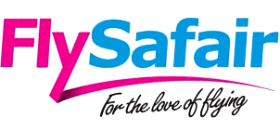 FlySafair Expands Fleet with Boeing 737 MAX 8s and 737-800NGs, Signalling Growth Ambitions
FlySafair Expands Fleet with Boeing 737 MAX 8s and 737-800NGs, Signalling Growth Ambitions
FlySafair, a leading player in the African aviation sector, has taken a decisive step to reinforce its growth trajectory and market dominance with the latest announcement of new leasing agreements. In a significant move, the airline will add three Boeing 737 MAX 8s and two Boeing 737-800NGs to its fleet, solidifying its status as one of the continent’s largest operators of the Boeing 737-800, matched only by EGYPTAIR.
This fleet enhancement follows the formal signing with AerCap, one of the world’s premier aircraft leasing companies. Under these new agreements, FlySafair will take delivery of the two 737-800NGs beginning in 2026, with the highly anticipated 737 MAX 8s joining the fleet from 2028. This strategic acquisition is designed to support FlySafair’s long-term vision, ensuring operational flexibility, expanded route options, and the ongoing delivery of reliable, cost-effective air travel for a diverse and growing customer base across sub-Saharan Africa.
The Boeing 737 MAX 8 is renowned for its superior fuel efficiency, advanced aerodynamics, and enhanced passenger comfort compared to earlier generations. Incorporating these next-generation aircraft positions FlySafair to benefit from reduced operating costs and a smaller environmental footprint, aligning with the global aviation sector’s increasing emphasis on sustainability. For African markets, where fuel prices and environmental regulations are exerting greater influence on airline strategies, such investments mark an important shift toward greener and more efficient operations.
The additional 737-800NGs will further strengthen FlySafair’s established network. The 737-800NG is a workhorse on the continent, prized for its reliability, flexibility, and suitability for both high-frequency domestic routes and medium-haul regional sectors. With these aircraft, FlySafair can maintain high operational standards while offering competitive fares and punctual services—key differentiators in Africa’s dynamic low-cost carrier landscape.
FlySafair’s enhanced fleet will provide the backbone for further network expansion and frequency increases on existing routes. This is particularly relevant as the region’s air travel market rebounds and new opportunities emerge for business, leisure, and VFR (visiting friends and relatives) traffic. The fleet growth will also enable the airline to respond swiftly to evolving passenger demand and shifting market dynamics, which are increasingly influenced by economic recovery and changing patterns of intra-African connectivity.
For the African travel sector, FlySafair’s continued fleet investment is a sign of renewed confidence in both regional and long-haul air travel. As one of Africa’s most prominent low-cost carriers, the airline’s fleet modernisation is likely to stimulate further competition, encourage innovation, and raise service expectations across the board. It also strengthens South Africa’s position as a regional aviation hub, supporting greater frequency, improved reliability, and expanded options for travellers and industry partners alike.
The partnership with AerCap, a global leader in aircraft leasing, also signals FlySafair’s robust financial planning and access to world-class aviation assets. Such collaborations enable African carriers to modernise their fleets without the heavy capital expenditure associated with outright aircraft purchases—an advantage that is increasingly important in today’s rapidly evolving aviation economy.
Alongside EGYPTAIR, FlySafair’s fleet size and strategic aircraft choices position it among Africa’s top operators of the Boeing 737-800, reinforcing the aircraft’s status as a backbone of commercial aviation on the continent. The arrival of the 737 MAX 8s will further distinguish FlySafair as a forward-thinking carrier ready to embrace new technologies and operational efficiencies that benefit both passengers and the environment.
Travel professionals and stakeholders across the region should take note of FlySafair’s fleet evolution. These developments are likely to create new opportunities for partnerships, distribution, and ancillary services while signalling broader trends toward fleet renewal and sustainable growth. As African aviation continues to recover and expand, airlines that invest in modern, efficient aircraft are poised to capture greater market share and deliver improved value to customers and partners.
With delivery timelines set for 2026 and 2028, FlySafair is clearly planning for the future, positioning itself to meet rising demand and shape the next era of air travel in Africa. The commitment to both tried-and-tested and next-generation aircraft underscores the airline’s strategic vision and its readiness to compete at the highest level in the continent’s vibrant aviation market.
